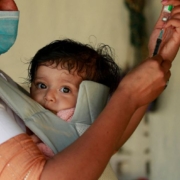The Omicron variant of the coronavirus is causing a dramatic rise in cases of croup, a dangerous respiratory condition usually seen in babies and toddlers, new data suggest. Additionally, new research sheds light on how a tuberculosis vaccine might help protect against COVID-19.
Studies Forge On as Omicron Surges and More COVID-19 News
BNT162b2 (Pfizer and BioNTech), Clinical Trials, Coronavirus Disease (COVID-19) Pandemic, COVID-19 Studies, COVID-19 Therapeutics, COVID-19 Vaccines, Data, Hospitalized COVID-19 Patients, Inhaled Formulations, Janssen COVID-19 Vaccine (J&J), mRNA-1273/Moderna COVID-19 Vaccine (Moderna), New England Journal of Medicine, Omicron (B.1.1.529) (South Africa), R&D, Therapeutics, VentilatorsIn the last two years, the sheer volume of scientific research focused on COVID-19 has been astounding: thousands of clinical studies, dozens of vaccines and new compounds, and hundreds of approved drugs tested for efficacy. More studies are still being run, especially in light of the Omicron surge and the virus’ ability to evolve.
Evidence emerging from lab experiments reveals weaknesses of vaccines and antibody drugs against the Omicron variant of the coronavirus. Additionally, a new study considers why COVID-19 patients on mechanical ventilators have trouble breathing and how refining a common treatment could help save lives.
Philips, the medical equipment maker that is recalling ventilators due to use of parts containing a potentially hazardous foam, said on November 14 the company is in discussions with U.S. regulators after a new inspection of one of its facilities.
Shared in Mesoblast dropped on the last day of August 2021 after the Melbourne-based biotech was told that the company’s investigational respiratory treatment for Covid-19 needed to undergo another trial in order to receive emergency use authorization (EUA) from U.S. Food and Drug Administration.
A new study on Covid-19 behavior has found that patients affected by the virus might have died due to a buildup of coronavirus directly in the lungs and not because of a secondary infection.
Eli Lilly and Co. and partner Incyte Corp. said on Aug. 3 additional results from a late-stage study showed their Covid-19 drug baricitinib reduced the risk of death in patients on mechanical ventilation.
Dutch medical equipment company Philips recalled some breathing devices and ventilators because of a foam part that might degrade and become toxic, potentially causing cancer.
Eli Lilly and Co. and Incyte Corp. said their rheumatoid arthritis drug baricitinib did not meet the main goal of preventing progression to mechanical ventilation in hospitalized Covid-19 patients under a late-stage study.
Topline results from an investigator-initiated trial in Brazil show that treatment with Kintor Pharmaceutical’s proxalutamide cut mortality risk by 92 percent and significantly shortened the median length of hospital stay by nine days compared with standard of care in hospitalized patients with coronavirus disease 2019.










